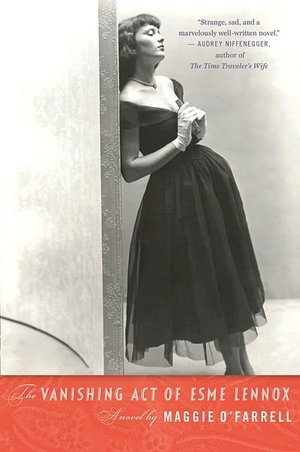I ended up picking The Vanishing Act of Esme Lennox for my Book Club to read in November. Because of the time of year, we needed a book that wouldn't take too long to read, but also had plenty of discussion points. I scrolled through my shelves and my GoodReads wishlist and finally settled on this one, fully expecting a straightforward, simply written story of a bygone era. What we found was so much more.
I found the premise interesting: A city called Edinburgh, an owner of a vintage clothing shop named Iris, and an unexpected phone call regarding her great-aunt Esme (whom she never knew existed) being released from an asylum after 60 years. Though they are basically strangers, Iris finds herself wrapped up in Esme's story nonetheless. It reminded me of The Secret Scripture, (a book I enjoyed,) and the cover of this edition was too lovely to pass up.
Esme was intriguing, her world magical--and we are offered a glimpse of it due to O'Farrell's sparse yet poetic writing. Did Esme have mental issues, or was she just different? How much would her life have been different if she'd been raised in a different time or family? Aren't all of our brains just a bit different in how they process things? Can't any normal behavior be twisted to look abnormal?
There is a rhythm to O'Farrell's writing that is captivating, making it one of those books that--once you get into the swing of its cadence--you don't want to put down, for fear that the world you've been enveloped in will dissipate and recede. This is a book to be quoted in paragraphs, rather than in sentences or pretty turns of phrase.
from page 58:
She flips back through time. 1941, 1940, 1939, 1938. The Second World War begins and is swallowed, becoming just an idea, a threat in people’s minds. The men are still in their homes, Hitler is a name in the papers, bombs, blitzes and concentration camps have never been heard of, winter becomes autumn, then summer, then spring. April yields to March, then February, and meanwhile Iris reads of refusals to speak, of unironed clothes, of arguments with neighbours, of hysteria, of unwashed dishes and unswept floor, of never wanting marital relations or wanting them too much or not enough or not in the right way or seeking them elsewhere. Of husbands at the end of their tethers, of parents unable to understand the women their daughters have become, of fathers who insist, over and over again, that she used to be such a lovely little thing. Daughters who just don’t listen. Wives who one day pack a suitcase and leave the house, shutting the door behind them, and have to be tracked down and brought back.Beautiful. I'll certainly be seeking out more of O'Farrell's works.

I've not seen this cover before, but I like it.
ReplyDeleteThis book is massive here in the UK, I really should get around to reading it.
Lovely review - my book club almost read this, but another book won the vote (and was terrible). So maybe we'll give this one another go!
ReplyDeleteWe read this for Book Club & it prompted one of the longest and deepest discussions on a book that I think we've ever had. I really like Maggie O'Farrell.
ReplyDeleteThank you for this lovely reminder of a book I adored. The writing was stunning and the issues raised by Esme's treatments stayed in my mind for weeks. I have another O'Farrell on my shelf and this reminds me that I really need to get to it!
ReplyDeleteSam, I probably first heard of it from a UK blogger then (good to know!) I did have a few minor quibbles with it (one of the story lines was a bit underdeveloped I thought) but overall I was engaged and interested.
ReplyDeleteBrooke, my group likes to choose books that we haven't read, which makes predicting the likability and quality of discussion a bit of a gamble, you know? This is a great one to be able to talk about afterwards--you guys should give it a shot!
Joan, ours too--one of the richest discussions in a long time. Have you read more of Maggie O'Farrell's books? Which was your favorite?
L.L., I loved the writing too. At times it made the plot somewhat obscure, but I prefer that to the alternative. I'm hoping to get to another of hers soon too. Which do you have on your shelf?
Will have to read this book as it sounds very good. These questions are what I think about all of the time:
ReplyDeleteAren't all of our brains just a bit different in how they process things?
Can't any normal behavior be twisted to look abnormal?
To which I would add:
Is there really an objective viewpoint from which we can witness events?
That is the scary thing about life: without belief in a God all we have are subjective viewpoints with no objective truth. Life then becomes a popularity contest.